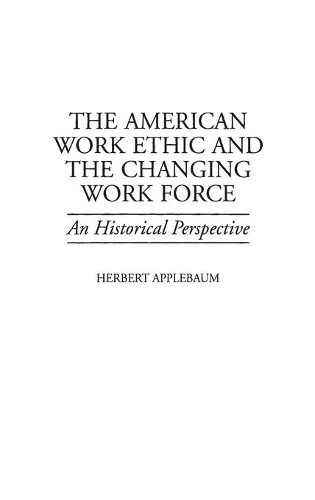
The American Work Ethic and the Changing Work Force: An Historical Perspective
(Hardback)
Publishing Details
The American Work Ethic and the Changing Work Force: An Historical Perspective
By (Author) Herbert Applebaum
Bloomsbury Publishing PLC
Praeger Publishers Inc
25th June 1998
United States
Classifications
Tertiary Education
Non Fiction
Ethics and moral philosophy
Social and cultural history
306.36130973
Physical Properties
Hardback
248
Description
A major force in American society, the work ethic has played a pivotal role in U.S. history, affecting cultural, social, and economic institutions. But what is the American work ethic Not only has it changed from one era to another, but it varies with race, gender, and occupation. Considering such diverse groups as Colonial craftsmen, slaves, 19th century women, and 20th century factory workers, this book provides a history of the American work ethic from Colonial times to the present. Tracing both continuities and differences, the book is divided into sections on the Colonial era, the 19th century and the 20th century and includes chapters on both major occupational groups, such as farmers, factory workers, laborers, and gender, racial, and ethnic minorities. This approach, which covers all major groups in U.S. history, enables the reader to discern how the work ethic applied to different occupational and ethnic groups over time. The book subjects the work ethic to an analysis based on historical, sociological, economic, and anthropological perspectives and provides an analysis of current thinking about how the work ethic applied to various groups and classes in different historical periods.
Reviews
The American Work Ethic performs its task. Applebaum sysnthesize America's industrial history and mixes in the voices of farmers, craftsmen, women, African-Americans, immigrants, and capitalists. * H-Net Reviews *
Author Bio
Herbert Applebaum, who received his PhD from SUNYBuffalo, is the author of five previous books on work, including, most recently, Colonial Americans at Work (1996). He has been active in the construction industry, both as a worker and in management positions. His other books include Royal Blue: The Culture of Construction Workers (1981), Work in Non-Market and Transitional Societies (1984), Work in Market and Industrial Societies (1984), Perspectives in Cultural Anthropology (1987), and The Concept of Work: Ancient, Medieval and Modern (1992).
